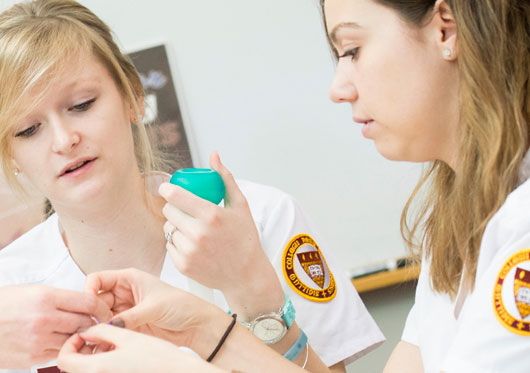The healthcare industry is booming, due in part to medical advances and in part to the fact that Americans are living longer than ever. With that old age comes an increased need for medical care to treat chronic medical conditions, such as diabetes, hypertension, dementia, and other conditions. It should be little surprise, then, that demand for healthcare workers like registered nurses and nurse practitioners—who are often seen as the front line of patient care—is also rising.
Another, somewhat lesser-known position is also seeing increased demand: The role of clinical nurse leaders (CNLs).
Whether you are just starting your career in nursing or you have been a nurse for a number of years and are considering your next steps in professional advancement, becoming a CNL could be an excellent option for you. Below, we take a look at who CNLs are and what they do, and briefly outline the key steps involved in breaking into the field.
What is a Clinical Nurse Leader?
A clinical nurse leader is an RN who has completed an advanced degree, typically a master’s degree with a CNL specialization, and who oversees the care of patients under their charge.
A CNL primarily accomplishes this by collaborating with the various caregivers that directly interact with their patients. This can include various nurses, doctors, aides, physical and occupational therapists, and more. The goal is to improve communication between medical professionals, ensure that patients are receiving quality care, reduce the potential for medical mistakes and errors, and generally improve patient outcomes. CNLs also ensure that healthcare systems, structures, internal policies, patient care, and research are managed properly.
Above all, CNLs act as a resource for the different members of their team, who turn to them with questions or for clarity as necessary.
The role of the clinical nurse leader was created by the American Association of Colleges of Nursing (AACN) in 2003 in response to a report that stated between 44,000-98,000 Americans die every year due to medical errors in hopes to prevent these errors, streamline operations throughout hospitals, and ultimately improve the quality of patient care.
What do Clinical Nurse Leaders do?
While the industry-wide mission of a clinical nurse leader remains the same, their day-to-day responsibilities can vary widely and are dependent on the type and location of their organization. As a CNL, you can expect to perform the following duties:
- Facilitating patient healthcare using evidence-based practice
- Assessing healthcare plans and risks for diverse populations
- Creating and overseeing safety standards in the working environment
- Mentoring, supporting, and coordinating patient care among nurses and other medical team members
- Delegating and overseeing overall care delivery and healthcare options for your patient cohort
- Researching and implementing industry technology trends
- Collecting and analyzing data to assess patient healthcare
- Reviewing and educating patients and their families on their health
- Meeting with hospital department leaders for patient status updates and needs (i.e., learn who’s ready for discharge, what their needs are, their length of stay, etc.)
- Ensuring all healthcare services and facility protocols are being followed
CNLs are involved with almost every aspect of patient care and coordination, making them trained generalists and operation managers instead of specialists focused only on providing direct and limited care to the patients they serve.
Requirements to Become a CNL
Clinical nurse leaders are both caregivers and leaders, so becoming one requires advanced education, training, certifications, and practice in medicine.
The first step to becoming a CNL is to be a practicing registered nurse. Though you can accomplish this by earning an associate’s degree in nursing, you will ultimately need to earn your Bachelor of Science in Nursing (BSN) in order to enroll in the requisite master’s degree program to become a CNL. For that reason, if you believe that you would like to one day advance within the field by becoming either a CNL or nurse practitioner, it’s generally recommended that you earn your BSN.
Many bridge programs also exist for individuals who have earned their associate’s degree, who wish to complete their BSN.
Typically, an individual will then work in the field for a number of years before taking the next step to become a CNL. At this point, you’ll enroll in a Master of Science in Nursing (MSN) program with a CNL specialization. Doctor of Nursing Practice (DNP) programs also exist.
Upon completion of your graduate education, you’ll need to pass the Commission on Nurse Certification (CNC) CNL exam. This will grant you your CNL certification. Your CNL certification will allow you to demonstrate your proficiency with leadership and management theory, mentorship skills, analysis and research abilities, clinical decision-making skills, in-depth knowledge of healthcare ethics, standards, and regulation, and, of course, training in healthcare practice that’s focused on evidence-based practice and research.
Keep in mind that the CNL program is designed to avoid duplicating too much of your previous nursing education by providing in-depth education solely on the skills you’ll need as a clinical nurse leader.
Typically, becoming a certified CNL can take anywhere from seven to eight years to accomplish, depending on your programs and educational training. You’ll also need to renew your certifications and stay up-to-date with industry news and technology.
And, because CNLs are often considered leaders within their organizations, you’ll need to hone your soft skills, too. You’ll need to learn how to prioritize the needs of multiple patients while retaining high-quality care, as well as be able to manage and support a group of nurses.
Having strong communication skills will enable you to work cross-functionally, and you’ll need to be resourceful and analytical to get the information you need, analyze and measure it, then build new strategies using data. As always, having strong problem-solving skills and being personable never hurts, either.
Overall, your keeping up with your certifications, training, and skill sets will help you to advance in your career as a clinical nurse leader.
Taking the First Step Toward a Rewarding Career in Nursing Leadership
Becoming a clinical nurse leader can be an extremely rewarding and challenging career. You’ll need to ensure you have thorough experience and training in the field, and, as a CNL, you’ll earn competitive salaries and benefits.
If you’re looking to have a significant impact on healthcare facilities, delivery of care, and the overall patient experience, you should pursue the CNL career path. After all, you won’t only save lives, but you’ll also drastically improve them day-to-day by managing the processes, operations, and people that provide the best medicine the industry has to offer.
Are you ready to take the next step toward becoming a clinical nurse leader? Learn more about Regis’s clinical nurse leader program.





